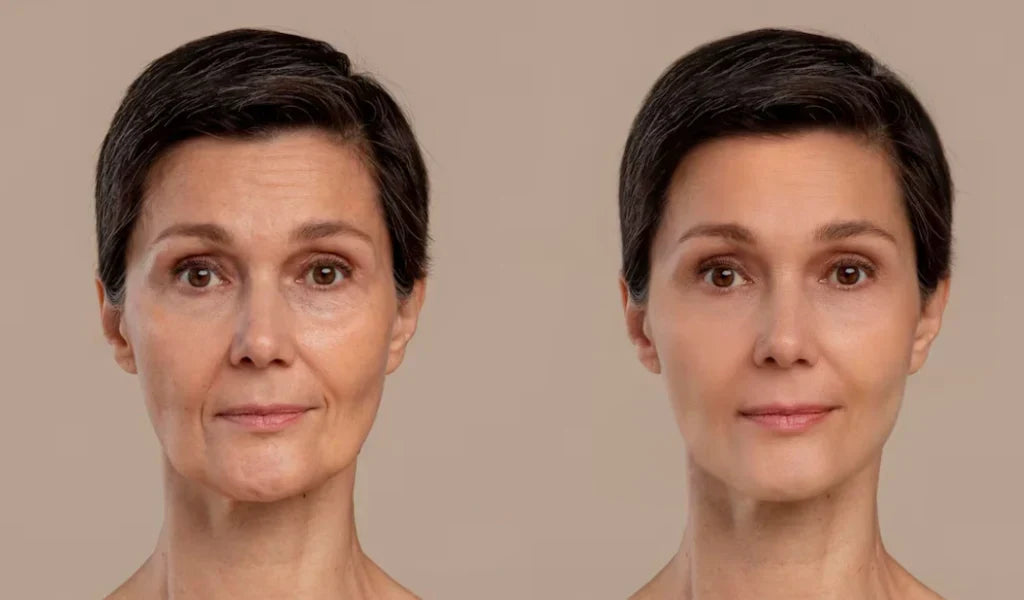
Anti-Aging Skincare: When and How to Start.
Share
Aging is a natural and beautiful part of life, but that doesn’t mean we can’t give our skin a little extra love along the way. If you’re wondering when to start an anti-aging skincare routine—or what it should even include—you’re not alone. The good news? It’s never too early (or too late) to start caring for your skin with intention.
Here’s your complete guide on when and how to start your anti-aging skincare journey.
When Should You Start an Anti-Aging Routine?
The truth is, prevention is easier than correction. Most dermatologists agree that your mid-20s to early 30s is the ideal time to start incorporating anti-aging products into your routine. Why so early? Because your skin's natural collagen production starts to slow down around age 25, and early signs of aging—like fine lines and loss of elasticity—begin subtly.
That said, if you’re in your 40s, 50s, or beyond, don’t worry. It’s never too late to make a positive change for your skin.
The Basics of an Anti-Aging Skincare Routine
Whether you're starting early or jumping in later, consistency and the right ingredients are key. Here's a beginner-friendly breakdown of what to include:
1. Gentle Cleanser
Keep your skin clean without stripping its natural moisture. A sulfate-free, pH-balanced cleanser is ideal for maintaining the skin’s barrier.
cerave foaming facial cleanser
2. Daily Sunscreen (SPF 30 or Higher)
If you do only one anti-aging step, let it be this one. UV damage is the number one cause of premature aging. Look for broad-spectrum protection and apply it every morning—even on cloudy days.
3. Antioxidants (Like Vitamin C)
These help protect skin from environmental damage and support collagen production. Use a vitamin C serum in the morning before applying moisturizer and SPF.
beauty of joseon light on serum + vit c
4. Moisturizer
Hydrated skin looks plumper and more youthful. Choose a moisturizer suited to your skin type, and consider one with hyaluronic acid for extra hydration.
5. Retinoids (Retinol or Prescription Retinoids)
These vitamin A derivatives speed up cell turnover, boost collagen, and help fade fine lines and sun spots. Start with a gentle retinol 1-2 times a week and build up slowly.
some by mi retinol intense serum for anti aging
6. Eye Cream (Optional but Helpful)
The skin around your eyes is thinner and often shows the first signs of aging. Look for ingredients like peptides, caffeine, or retinol (in lower concentrations).
Tips for Success
-
Start slow: Introduce one product at a time to avoid irritation.
-
Be patient: Anti-aging results don’t happen overnight. Most products take 6–12 weeks to show visible improvement.
-
Listen to your skin: If something causes redness, flaking, or burning, scale back or consult a dermatologist.
-
Don’t overdo it: More isn’t always better. Over-exfoliating or layering too many actives can backfire.
Bonus: Lifestyle Habits That Support Youthful Skin
Skincare is only part of the equation. For truly healthy skin, support your routine with smart lifestyle choices:
-
Stay hydrated
-
Eat a balanced, antioxidant-rich diet
-
Get enough sleep
-
Manage stress
-
Avoid smoking
Final Thoughts
Starting an anti-aging skincare routine doesn’t mean chasing eternal youth—it’s about feeling confident and comfortable in your skin at every age. Whether you’re 25 or 55, showing your skin some love now will pay off in the years to come.
Ready to get started? Take it step-by-step, stay consistent, and remember: aging is a privilege. Let’s embrace it with glow-worthy grace.